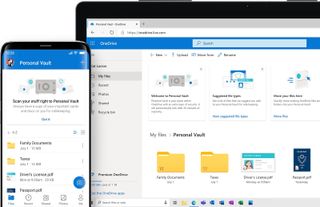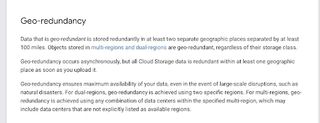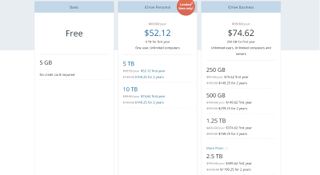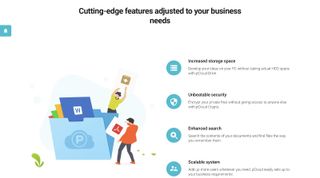Cloud storage for business: 10 benefits your competitors already enjoy
Leverage cloud storage to create a more secure, accessible, and collaborative digital workspace

Cloud storage technology has come a long way in recent years, and today most businesses use cloud storage for some or all of their storage needs. Some of the most popular platforms include Microsoft OneDrive, NextCloud, and pCloud.
In this article, we outline ten benefits that your competitors using a cloud storage platform are already enjoying. After reading, if you’re convinced that it’s time to invest in cloud storage for your business, check out our buying guide to the best cloud storage platforms.
1. Data encryption

Almost all cloud storage platforms now provide some type of encryption as a standard feature, included in all plans. The most common type is 256-bit AES encryption in transit and at rest. This is adequate for all but the most high-security organizations, and will make it nearly impossible for unauthorized persons to decrypt your data if they obtain it.
The best platforms however provide end-to-end encryption, which is a type of zero-knowledge security architecture. This means that no one, not even the cloud storage provider, can access your data without your permission. So even if law enforcement compelled your cloud storage provider to share your data, they wouldn’t be able to.
2. Multi-factor authentication

Businesses constantly face the threat of cyberattacks, particularly if employees’ accounts aren’t secure. Fortunately, the best cloud storage platforms make it easy to protect your data and ensure that every account connected to your business is protected.
The easiest way to secure employee accounts on a cloud storage platform is with multi-factor authentication (MFA), or two-factor authentication. MFA means that all users will have to provide their password as well as a second (or even third) method of authentication when logging into the platform. Typically, the second factor is a one-time password sent to a mobile device, or a code generated in an authenticator app. The top cloud storage platforms even enable administrators to enforce MFA, which we highly recommend.
3. Mandatory password standards

While we’re on the topic of securing employees’ accounts, it’s worth discussing password security. Weak passwords are one of the most common causes of cyberattacks and data loss for organizations. Fortunately, the top cloud storage platforms enable administrators to set minimum password standards for all employees. This may be a minimum password length, a requirement to include special characters, or a requirement to reset the password periodically.
Sign up to get the BEST of Tom’s Guide direct to your inbox.
Upgrade your life with a daily dose of the biggest tech news, lifestyle hacks and our curated analysis. Be the first to know about cutting-edge gadgets and the hottest deals.
Ensuring all your employees create strong and unbreakable passwords is one of the easiest ways to ensure that your business data isn’t stolen or deleted. Fortunately, the top cloud storage providers make this easy to achieve.
4. Access on all devices

The best cloud storage platforms provide apps for most operating systems, including macOS, Windows 10, iOS, iPadOS, and Android. Some are even compatible with Linux.
Multi-device support provides several benefits to a business. It enables you to make last-minute changes and revisions to important documents if you don’t have access to your primary device, and it enables managers to supervise and approve work even when out of the office. And perhaps most importantly, it enables users to share files with colleagues or clients from anywhere.
5. Geo-replication of data

Many businesses now have customers worldwide, which can pose problems if all your data is stored in one country. This can result in lagging websites and slow download speeds for overseas customers. Fortunately, the best cloud storage platforms now provide geo-replication of data for businesses. Geo-replication means data is stored on several servers in different countries or regions, making it quicker for overseas customers or employees to access your stored data.
Because the vast majority of businesses will never maintain their own physical storage infrastructure in other countries, this is one of the biggest advantages of cloud storage compared to on-prem storage.
6. Data redundancy

Businesses requiring constant data availability need to ensure that a failure at one data center won’t compromise their operations. Fortunately, the top cloud storage platforms provide data redundancy measures for precisely this purpose.
Like data geo-replication, data redundancy ensures data is copied across multiple locations within a single country or across the world. So even if one center goes down, your data will still be available. Most enterprise cloud storage products feature built-in data redundancy.
This is something that just isn’t feasible or cost-effective when self-hosting storage.
7. Data retention and administrator auditing

With a significant proportion of business operations now occurring in the digital space, it’s more important than ever that business leaders can keep track of how employees are using online platforms.
Fortunately, most enterprise cloud storage plans provide administrators and human resources personnel with a wide range of auditing functionalities. These features enable you to see how and when platforms are being used, and quickly identify security risks or misuse of resources.
8. More affordable storage

A truism about cloud storage is that it is almost always more affordable on a per-GB basis than on-prem storage. This is due to the economies of scale that the biggest providers achieve by maintaining huge data centers across the globe.
If your company needs an affordable way to store large quantities of archived or regulatory data, then a cloud storage plan is likely your best option. For example, IDrive offers 12.5TB of storage space for $2,250 per year, which is extremely affordable compared to an equivalent amount of on-prem or self-hosted storage.
9. A more scalable storage system

Along with being more affordable, cloud storage platforms are also more scalable than traditional on-prem solutions. With nothing more than the click of a button, you can upscale and downscale your storage allowance and adapt to your organization’s evolving needs. This enables you to optimize your spending and ensure you only pay for what you use.
Some platforms, such as pCloud, also provide scalable security, meaning that you can add and remove high-end security features (like end-to-end encryption) as needed. These areas of flexibility are something that just aren’t possible with self-hosted, on-prem storage infrastructure.
10. Seamless cloud syncing across devices

Cloud syncing is one of the most important features of a cloud storage platform, as it enables users to collaborate in real-time from any connected device. If you’re not using cloud sync technology, then you’re falling behind the pack.
Put simply, cloud sync ensures the most up-to-date version of a document is always available. So if you’re editing a document at home, your colleagues in the office will see your changes in real-time. They can then provide feedback through comments, and make their own changes.
Cloud sync, therefore, enables businesses to collaborate online like never before, something that is more important than ever in 2021 as most of us continue to work from home.
Summary

So there you have it, 10 benefits your customers enjoy from using a cloud storage platform - 10 benefits you might be missing out on. We think the right cloud storage solution can make your business more secure, agile, and productive.
- Read our Microsoft OneDrive review
- Read our Google Drive review
- Read our pCloud review
- Read our IDrive Personal cloud backup review
Darcy is a freelance copywriter, and a candidate for the dual master's program between the Paris Institute of Political Studies (Sciences Po) in France and Peking University in Beijing, China. His academic and professional areas of interest include human rights and development, sustainable agriculture and agroecology, Pacific Islands diplomacy, and Sino-Australian relations.

I don’t miss gas powered lawn mowers after using my Greenworks electric mower for a year — and it’s 34% off right now

Forget OLED TVs — this new triple-laser projector can beam a 150-inch picture with 3,000 lumens of brightness

Memorial Day Nintendo Switch deals 2024 — best early sales right now from $5
